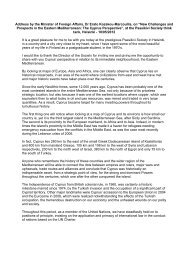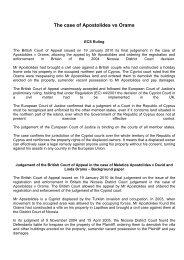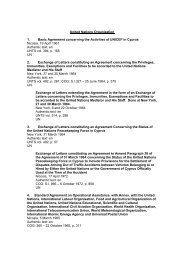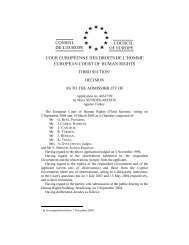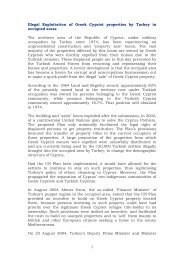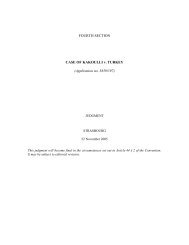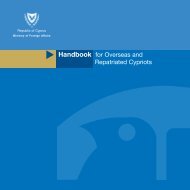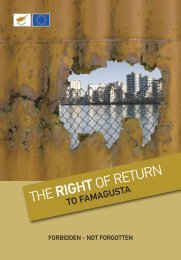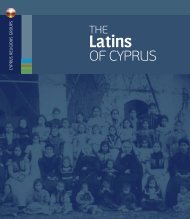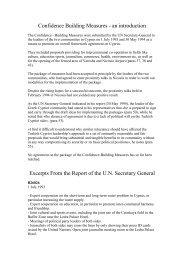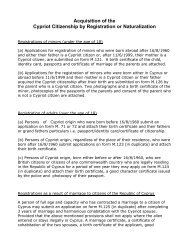CAAG INSIDE ENGLISH 2011_Layout 1.qxd - Ministry of Foreign ...
CAAG INSIDE ENGLISH 2011_Layout 1.qxd - Ministry of Foreign ...
CAAG INSIDE ENGLISH 2011_Layout 1.qxd - Ministry of Foreign ...
You also want an ePaper? Increase the reach of your titles
YUMPU automatically turns print PDFs into web optimized ePapers that Google loves.
16<br />
History<br />
Cyprus´ civilisation, according to archaeological<br />
evidence, goes back 11.000 years to the 9th<br />
millennium BC (early Neolithic Period or Stone Age).<br />
The island acquired its Greek character after it was<br />
settled by the Mycenaean-Achaean Greeks between<br />
the 13th and 11th century BC. In the mid- 9th century<br />
BC Phoenician settlers began to arrive, concentrating<br />
mainly in the coastal city <strong>of</strong> Kition. Subsequently,<br />
Cyprus came, in turn, under Assyrian, Egyptian and<br />
Persian domination (8th – 4th century BC). It became<br />
part <strong>of</strong> the Roman Empire between 30 BC and 330 AD.<br />
However, it retained its Greek identity and, as part <strong>of</strong><br />
the Hellenistic state <strong>of</strong> the Ptolemies (310-30 BC) and<br />
<strong>of</strong> the Greek-speaking world <strong>of</strong> Byzantium (330 AD-<br />
1191), its ethnic heritage was kept alive. The Greek<br />
language and culture also prevailed throughout the<br />
centuries that followed even though Cyprus came<br />
under the rule <strong>of</strong> successive foreign powers – King<br />
Richard I (the Lionheart) <strong>of</strong> England and the Knights<br />
Templar (1191-1192), the Franks (Lusignans) (1192-<br />
1489), Venetians (1489-1571), Ottoman Turks<br />
(1571-1878) and British (1878-1960).<br />
The Greek Cypriots mounted an anti-colonial liberation<br />
struggle against British rule from 1955 to 1959. In 1960<br />
Cyprus gained its independence and became a<br />
constitutional Republic. Greece, Turkey and<br />
Britain were to stand as guarantors <strong>of</strong> the country’s<br />
independence under the Zurich-London agreements<br />
and Britain would retain two sovereign base areas. The<br />
military bases, one at Akrotiri/Episkopi and the other<br />
at Dhekelia, cover 2,7% <strong>of</strong> the island’s territory.<br />
Political power was to be shared between the Greek<br />
and Turkish Cypriots on a 7:3 ratio. This gave the<br />
Turkish Cypriot community (a numerical minority <strong>of</strong><br />
18% <strong>of</strong> the population) 30% representation in the<br />
government and state institutions. In addition, the<br />
Turkish Cypriot community had veto rights on major<br />
issues.<br />
Relations between the two communities had for<br />
centuries been peaceful and amicable. However,<br />
certain provisions <strong>of</strong> the Zurich-London agreements<br />
and the 1960 Constitution (which were effectively<br />
imposed on the people <strong>of</strong> Cyprus) were to prove




